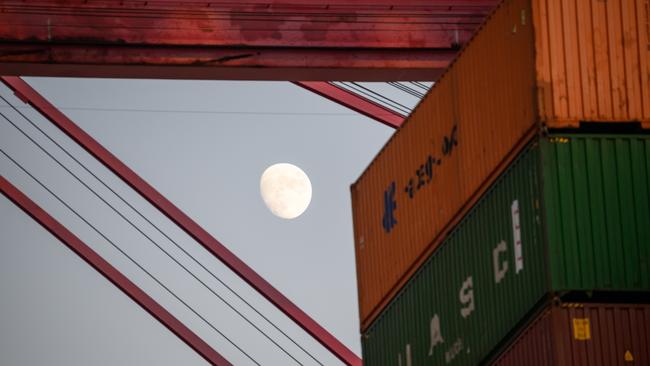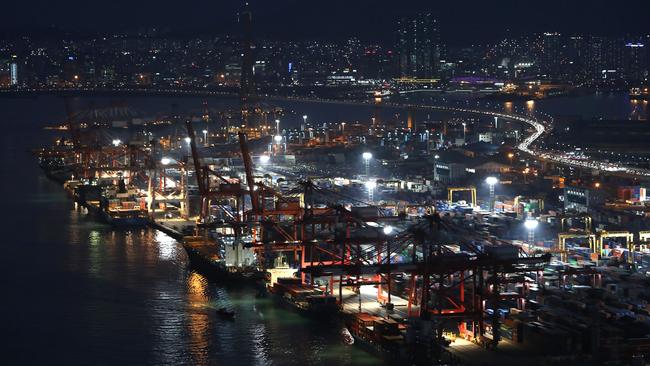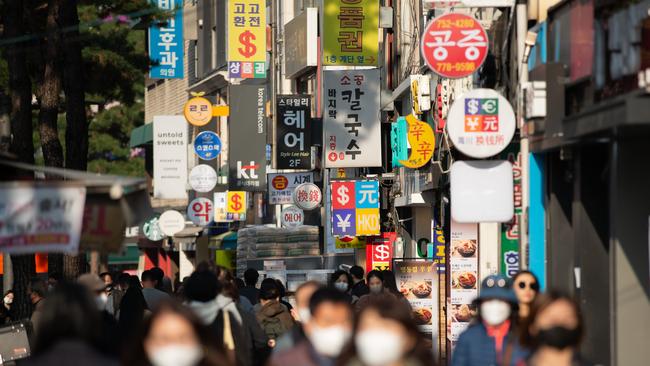South Korea’s shared concerns as China economy slows
South Korea’s Trade Minister Dukgeun Ahn says his country’s biggest concern with China is its slowing economy, bogged down by Xi Jinping’s tight Covid-19 regime.

When it comes to his neighbour, South Korea’s Trade Minister has bigger worries than another bout of Chinese coercion.
In a wide-ranging interview with The Australian in Seoul, Dukgeun Ahn says what concerns him most about China is its slowing economy. South Korea’s biggest customer is bogged down under Xi Jinping’s tight Covid-19 regime and the country’s worst ever property crisis.
The situation was much easier when Seoul was just dealing with an angry Beijing.
“When China tried to limit its imports, you could actually find other markets,” says Dr Ahn, a professor in international trade law before he was appointed Trade Minister in May. “But when global business is going down then basically we cannot find any other alternatives. So economically speaking that situation is much more serious.”
Worrying South Korean President Yoon Suk-yeol’s government – just as it is now worrying Jim Chalmers – is Beijing’s muddled messaging which suggests there is no plan to move beyond the so-called Covid-zero policies that are crippling the world’s second biggest economy.
Exports to China have fallen for five straight months. Shockingly for Seoul, it is now running a trade deficit with Beijing for the first time in 30 years.

Mr Yoon’s response is similar to Canberra’s – find other markets. “It is very important to have diversified networks to source the material and to send our products,” says Dr Ahn. “We can reach out to many other regions: the Middle East, Latin American or the European Union.”
There are few counties in the world more useful for Australia to swap notes with than South Korea, the third biggest source of our exports and a fellow American ally trying to navigate today’s stormy geoeconomics.
The tempo of meetings has quickened. Trade Minister Don Farrell last month met with Dr Ahn in Seoul. Defence Minister Richard Marles visited in August.
Mr Yoon and Anthony Albanese met again recently in Cambodia. Sources have told The Australian the Prime Minister is preparing to visit Korea next year, although no date is confirmed.
Into the freezer
Canberra learned valuable lessons from Seoul’s encounter with “International Trade with Chinese Characteristics”.
In 2016, four years before Beijing launched its trade black-listing of Australian exports, Seoul was punished for installing a US-designed anti-ballistic missile system. Called THAAD, Seoul argued it was to protect against China’s ally North Korea. Mr Xi saw things differently.
Instead of coal, wine and lobsters, Beijing targeted South Korean Lotte hypermarkets, halted Chinese tourism and black-listed popular K-pop groups and Korean dramas. All the while, South Korea’s most lucrative export to China – semiconductors – was traded without trouble. Such was demand that South Korea’s total exports to China increased by almost 15 per cent in 2017 during the peak of Beijing’s fury.
Australia had a similar experience in 2020 when – despite Beijing’s anger – the lucrative iron ore trade went untouched. Both revealed the limitations of Beijing’s coercive practices against sophisticated trading economies.
Mr Yoon, who came to office in May, campaigned on a platform that included strengthening South Korea’s alliance with the US, and working with fellow allies, including Australia.
Just like the Albanese government, Seoul is trying to stabilise relations with all of its major trading partners, including China.
But, unlike Australia, South Korea’s economy is significantly entangled in the increasing US tech restrictions placed on China.

“Countries like Australia and Korea that rely on the global market feel huge pressures and face lots of obstacles,” says Dr Ahn. “So from the trade ministry point of view, the global trading system becomes very difficult – kind of a jungle. But that’s how we live. So we have to find a way to survive.”
The World Trade Organisation remains in a state of disarray after the Trump administration crippled its dispute mechanism – collateral damage in the no-holds-barred trade war between the US and China.
Dr Ahn sees a lot of scope for Australia and South Korea to work together to improve the international trade umpire.
The bilateral relationship is humming. Only China and Japan buy more Australian exports. Wine sales are booming, as is beef, another product on Beijing’s blacklist. But the mainstays are energy and resources.
As with Australia’s economic relationships with Japan, China and Taiwan, the government is focused on finding lower carbon sources of energy to replace Australia’s current dominant exports to North East Asia, coal and LNG. Australian businesses, such as Andrew Forrest’s Fortescue Metals, are investing huge sums.
Tip-toeing to CPTPP
For years, Australian officials have been frustrated by the difficulty of getting South Korean counterparts to engage on strategic issues in the wider region.
Not surprisingly, North Korea – a hereditary dictatorship – takes up a lot of Seoul’s bandwidth. Weeks ago, Pyongyang claimed to have tested “a new kind” of intercontinental ballistic missile.
Then there is the still raw dispute between Japan and South Korea. It is a key reason Seoul has not joined the CPTPP, a trade pact that only exists because of the activism of the late Japanese prime minister Shinzo Abe.
The Yoon government is trying to mend the relationship, although it has to bring along a public in which badwill about its former coloniser is commonplace.
“We feel very sorry about the current situation,” says Dr Ahn, noting Europe and Southeast Asian nations have been able to get beyond their painful histories.
“Korea, Japan, China are struggling against each other based on our history issues. It is a pity. I hope that some visionary politicians can solve the problem.”
In recent weeks, Mr Yoon met in Cambodia with Japan’s Prime Minister Fumio Kishida. There is talk a bilateral visit may happen in the new year, although the domestic politics remain tricky. “It will take some time,” says Dr Ahn.



To join the conversation, please log in. Don't have an account? Register
Join the conversation, you are commenting as Logout